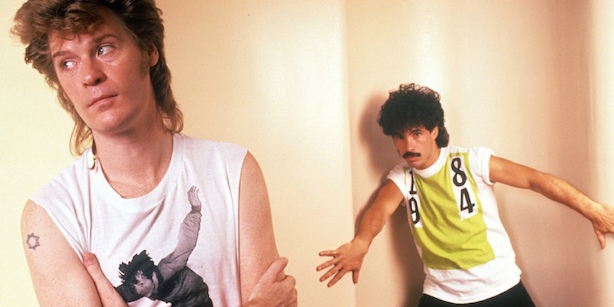 Music
Music
5 soft-rock artists who went new wave
by Anthony Hansen
March 22, 2016
These artists made the transition from the '70s to the '80s with mixed results.
“New wave” has always been something of an ambiguous term – inasmuch as it can mean “pop music with punk influences” it’s also been used as a broad catchall term for “literally everything from the late ’70s that didn’t sound like everything else from the ’70s”.
Either way, it’s hard to imagine how the determinedly mellow world of soft-rock, that most ’70s of genres, would ever find itself in the same orbit as new wave. And yet, with no small effort, some soft-rock acts did make the leap. Here’s where they landed.
The Artist: Fleetwood Mac
Just How Soft Were They?
Soft, but with quite a few spiky edges. The undercurrents of inter-group relationship tension and the volatile temperament of guitarist/vocalist Lindsey Buckingham lent them a fair amount of emotional intensity, but there was always a thick layer of slickness to balance it out. That is, until…
The Change:
Lindsey Buckingham always seemed like he was the least comfortable with Fleetwood Mac’s status as a radio-friendly hit machine, so it makes sense that Tusk, their most difficult and demanding album, was also the one that he had the most control over creatively. Inspired by the DIY ethos of the punk movement, he festooned the album with his home studio demos, and while some of the songs show him indulging in some serious Brian Wilson hero worship, others were clearly direct responses to the changing musical climate of the times.
At least, that’s one way to interpret a song like “Not That Funny”: though its stiff, jerky rhythm and tense, jittery vocal performance suggest an affinity for bands like Talking Heads, it’s still pretty obvious that Buckingham is more of a California folkie than a New York punk.
Did It Stick?
Not really. Though Tusk has retroactively been upgraded to “classic album” status (and rightly so), it was initially considered a disappointment in comparison to their previous two blockbusters. The band followed up Tusk with Mirage, a self-conscious return to the more “traditional” Fleetwood Mac sound (much to Buckingham’s chagrin).
The Artist: Paul McCartney
Just How Soft Was He?
In the ’70s? Somewhere between puppy fluff and the whisper of an extremely patient librarian. Though his songwriting chops never quite left him, there’s no denying that Paul McCartney spent a good chunk of the ‘70s indulging in his schmaltziest and most sentimental tendencies with syrupy hits like “My Love”, “Silly Love Songs” and “Let ‘Em In”, and when Wings released the tepid 1-2 punch of At The Speed of Sound and London Town, it seemed like McCartney had settled into the soft side of things for good.
The Change:
The first signs of new life came with Wings’ swan song Back To The Egg, McCartney’s return to “real” rock music. While the album’s stripped-down production showed that McCartney was at least dimly aware that punk and new wave were a thing (particularly on the manic “Spin It On”), it would be his subsequent solo effort McCartney II that showed how closely he was keeping his ear to the ground.
Though the album features the infectious hit “Coming Up” and two synth-driven instrumentals that wouldn’t be out of place on a Yellow Magic Orchestra record, the album’s most memorable song, for better or much worse, is the bizarre, brain-stabbingly obnoxious “Temporary Secretary”.
Though the opening synth pattern suggests that this might be McCartney’s own answer to minimal synth bands like The Normal, the stupid lyrics and whiny vocal delivery are bound to void even the most forgiving attention span.
Did It Stick?
God, can you imagine? No.
The Artist: Todd Rundgren
Just How Soft Was He?
Depends who you ask. Calling Todd Rundgren a “soft rock” artist does a huge disservice to how eclectic and downright bizarre his discography can get, but as far as the american pop charts in the ‘70s were concerned, that’s what he was. Hits like “Hello It’s Me”, “Can We Still Be Friends” and “I Saw The Light” showcased Rundgren at his most sensitive and sweet-natured, with his more impish tendencies kept firmly in check.
The Change:
Perhaps as a side effect of his notoriously short attention span, Rundgren also had a full-band project called Utopia, and though they began as an outlet for his more progressive-rock-ish tendencies, by the end of the decade they had streamlined their sound and were ready to embrace the new wave boom.
1980’s Adventures In Utopia was a slick, modern-sounding album that even managed to spawn a modest top 40 single (“Set Me Free”), but the album’s most obvious bid for new wave credibility was the on-the-nose Cars pastiche “You Make Me Crazy”, sung with Ben Orr-aping gusto by the band’s drummer, John Wilcox. One listen and Rundgren’s tenure with The New Cars suddenly makes a lot more sense.
Did It Stick?
Yes. Ignoring the ill-fated, Rutles-esque Beatles pastiche Deface The Music, Utopia spent the rest of the ’80s as Rundgren’s new wave pop project, allowing him the freedom to take his solo career in even more unpredictable directions than before. (New age? Sure! An a capella album? Why not?)
The Artists: Hall & Oates
Just How Soft Were They?
Though they’d already started to move away from their patented white-soul sound in the late ’70s, hits like “Sara Smile”, “She’s Gone” and “Rich Girl” are about as smoothly ’70s as you can get without cramming yourself into some high-waisted bell bottoms.
The Change:
Of all the bands on this list, Hall & Oates are the only ones whose interest in new wave music marked a crucial turning point in their sound rather than a passing indulgence. Though they never stopped churning out slick, radio-friendly top 40 hits, their production techniques also evolved with the times, making their songs an effective compromise for those who wanted “modern”-sounding music without having to venture too far out into left field… all of which makes it easy to forget that their first forays into new wave came at a time when they were trying pretty much anything to stay relevant.
1979’s X-Static was the kind of album that practically reeked of flop-sweat desperation, jumping on to the disco bandwagon just as the wheels were coming off, awkwardly flirting with reggae on “Number One”, and then ending with some hard-edged new wave rock songs because at that point who even gives a shit.
Given the context, it’s surprising how well those last few songs hold up – were a song like “Bebop/Drop” just a bit rougher around the edges production-wise and a little less dopey lyrically, it would probably hold up well alongside some of Bowie’s records from the same era (okay, probably not, but given that Daryl Hall and Robert Fripp recorded an art-rock album together in 1977, the comparison is less of a stretch than you might think).
Did It Stick?
Like hell it did. From this point forward until their late-’80s chart decline, every subsequent Hall & Oates album would have a few choppy new wave numbers in amidst the radio hits.
The Artist: Billy Joel
Just How Soft Was He?
Listen to songs like “Just The Way You Are” and “She’s Always A Woman” and I guarantee you will never ask me that question again.
The Change:
Unlike the other artists on this list, it’s clear that Billy Joel didn’t see what the big fuss was about. As far as he was concerned, people could call it “new wave” all they wanted, but at the end of the day it was still… well, check the title. The (possibly intentional?) irony was that, in 1980, Joel was just starting to write more rock-oriented material as a way of shaking up his piano-balladeering milquetoast image.
This essentially makes “It’s Still Rock And Roll To Me” a kind of variation on the classic “I am going to literally start this conversation by dismissing whatever everyone thinks is cool” social tactic so beloved by terminally insecure grown-up children the world over. The song’s contradictory “PLEASE PAY ATTENTION TO HOW LITTLE I CARE ABOUT YOU” message is emphasized tenfold by the video, where Joel delivers a mannered, almost Shatneresque performance of sneering contempt that grossly miscalculates how much aggression the song merits. Credit where it’s due, though: this was a pretty sharp left turn for someone whose previous big hit was the yacht rock-y “My Life.”
Did It Stick?
Not unless you think “We Didn’t Start The Fire” counts.
Tags: Music, Lists, Billy Joel, Fleetwood Mac, Hall and Oates, new wave, paul mccartney, soft rock, Todd Rundgren





